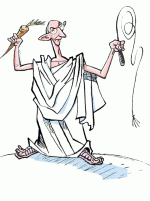WTO Ministerials: a playground for EC power politics
It is at the World Trade Organisation's (WTO) biannual ministerial meetings, and during the highly politicised periods preceding them, that the cynicism of the European Commission's 'development-friendly' rhetoric is most clearly revealed. Rather than supporting the positions of developing countries, the Commission uses bullying tactics to submit these nations into accepting the EU's agenda.
For example, the Commission routinely threatens to withdraw preferential trade agreements from developing countries that do not tow the EU line. Asked why his country backed down from its opposition to the controversial 'Singapore Issues', one African delegate said, "Well, we have preferential arrangements with the EU on beef and sugar. They would have removed that."[1]
A similar example of the Commission's strong-arm tactics is how it uses the preferential trading relationship between the EU and the African, Caribbean, and Pacific countries (ACP) to leverage developing country support for EU positions. The Commission has skilfully exploited the ACP's fear that without the Commission's support, the 'ACP waiver' would not be renewed by the World Trade Organisation, a sure-fire way to ensure ACP compliance for the Commission's ambitions. Further, the Commission silenced non-ACP member Bolivia -- which felt the ACP waiver was unfair -- by threatening the withdrawal of its EU trade preferences. Other dissenters were crushed with the help of the United States. Said a Central American delegate: "Franz Fischler, EC Agriculture Commissioner, said directly to us Central American negotiators that they [the EC] would get what they wanted -- i.e. the [ACP] waiver -- and that he did not care about our rights."[2]
In the periods leading up to the WTO ministerials, the Commission and the other major powers use a combination of bilateral pressure and dirty tricks to make the ministerials themselves as 'smooth-sailing' as possible. One common tactic is circumventing tough developing country negotiators by going straight to their elected superiors, where bilateral inducements, threats, and 'gentle reminders' are used to alter government positions and encourage the removal of troublesome Geneva-based negotiators.[3]
Despite unconvincing noises from EU Trade Commissioner Pascal Lamy about a code of conduct,[4] the major WTO powers make no substantial effort to fix the trade organisation's procedures that allow power politics to rule the day. With this the case, the Cancun ministerial shows signs of becoming just as undemocratic, maybe even more so, as past ministerials.
Recommended reading:
- Behind the Scenes at the WTO: the Real World of International Trade Negotiations, Fatoumata Jawara and Aileen Kwa, Zed Books, London, August 2003.
- Report from WTO Ministerial in Doha, Qatar, World Development Movement, November 2001.
- Cancun Democracy Challenge, Civil Society Statement to the WTO, July 2003.
Notes
- Aileen Kwa, Power Politics in the WTO, Focus on the Global South, January 2003 (second edition). Back
- This quote is taken from Chapter 6 ("The Gentle Art of Persuasion - Arm-Twisting and Pay-Offs") of the Jawara/Kwa book mentioned in the "recommended reading" section. The delegate spoke on condition of anonymity. Back
- See the aforementioned books by Kwa and Kwa/Jawara for more details of these tactics. Back
- "... Pascal Lamy recognized that developing countries are sometimes put under unacceptable pressure in WTO negotiations. He stated that the EU categorically rejected these methods and that he would support the EU subscribing to a code of conduct if other WTO members were also prepared to sign." While this is in principle a positive gesture, it is greatly weakened by the condition, "...if other WTO members were also prepared to sign." WTO dynamics are such that reforms are unlikely unless one or more of the major powers takes the initiative. "Lamy ready to subscribe to code of conduct in WTO negotiations", CIDSE/SOLIDAR/OXFAM press release, May 9, 2003. Back
